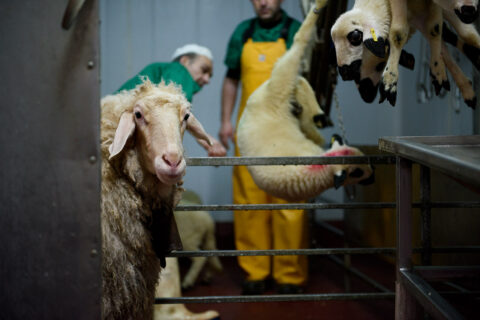Investigation
Oklahoma’s Loophole: How Tyson’s Water Use Goes Unchecked
Food•15 min read
Reported
Supply chain problems and workplace infection risks mean experts are urging U.S. producers to focus on sustainability.

Reported • Food • Food Systems

Words by Amanda Holpuch

Americans are nearing a future where the nation’s beloved steak dinners, cheeseburgers, and barbecue are under threat, if the world’s second largest meat processor is to be believed.
Tyson Foods warned “the food supply chain is breaking” last week and said meat shortages were on the way to the US because the coronavirus pandemic was forcing it and other big companies to close several meat processing plants as their workforces became infected.
But for some critical observers, the crisis in America’s huge industrial meat production sector came as no real surprise. Will Harris, a cattleman at White Oak Pastures in southern Georgia, said he always knew a “trainwreck” would hit the factory farming industry.
Harris knows intimately how fragile factory farms and their supply chains can be, because for two decades, he raised cattle for the industrial beef production system.
“For the past 70 years, big multinational corporations have moved our food system further and further down the road of focusing only on efficiency, only on taking costs out of production,” Harris said. “And in doing that they created a very fragile food system where a lot of things can go wrong.”
But Harris said there is an alternative: his style of farming.
Harris moved towards sustainability in the 1990s because of concerns about the environment and animal welfare. White Oak Pastures, which has $20m in annual sales to Tyson’s $42bn, has not sent panicked missives warning about meat shortages and is not being forced to kill its animals, as farmers who rely on corporate processing plants are.
Instead, online sales have jumped fivefold; it has hired 16 more full-time employees; and any slowdown in processing will simply mean cows have more time to munch and meander in the grass.
“We’re not bulletproof. I could have a lot of people get this sickness and have to close the plant. I hope not, but it could happen,” Harris said. “But we are doing all we can to prevent it, not just because of the economics of closing the plant but because we don’t want our people sick.”
In a country where people consume on average more meat each day than the government recommends, the COVID-19 outbreak is far from catalysing a meat-free America.
Instead, it’s exposing how fragile big meat’s supply chain is and making a case for smaller, more resilient models.
“This virus is a warning shot, and it provides us with an opportunity to change our food system in ways that are less susceptible to disruption,” said Bob Martin, food system policy director at the Johns Hopkins Center for a Livable Future.
Issues with factory farming are well-documented. Slaughterhouses are one of the most dangerous workplaces in the country; employers often exploit a mostly immigrant workforce; increasing line speeds threaten food and worker safety; and meat consumption is a huge drain on the environment.
The alternatives, meanwhile, appear to be thriving in the wake of the outbreak.
White Oak is among the independent farms and butchers seeing a growth in business because of the outbreak. At Marksbury Farm in Kentucky, individuals and grocery stores were seeking more of its grass-fed, antibiotic-free beef. Restaurants have been selling their supply direct to consumers, and other small farmers have turned to social media to do keep up with demand.
The problem Tyson warned of is not actually a meat shortage, but a shortage of slaughter capacity.
Workers at industrial slaughterhouses, who are overwhelmingly immigrants and people of color, are among the most vulnerable to COVID-19 because of their working conditions. At least 20 workers have died and more than 5,000 have been infected, forcing some slaughterhouses to shut.
For operations like Tyson’s—which had capacity to process 45.6 million heads of beef, pork, and poultry a week in 2019—one plant closure can cause a glut of millions of chickens or thousands of hogs at one farm. Industrial farms don’t have the space or resources to keep these animals alive, and millions are expected to be euthanized in the coming weeks.
Industrialization forced U.S. farmers to be more dependent on slaughterhouses belonging to just four multinational corporations. In 1967, there were 10,000 state and federal inspected slaughter facilities across the country. Today, there are 2,700.
A lobby which represents cattle farmers and ranchers, R-Calf USA, wrote to the White House urging it to consider restructuring the beef industry so there are more plants owned by more people. “This high level of physical and geographical concentration of America’s vital beef supply chain is intuitively and inherently contrary to America’s food security interests, as now unequivocally demonstrated by COVID-19,” the letter said.
Despite Tyson’s warnings about meat shortages, executives painted a much rosier picture of their financial situation in an earnings call this week.
The value of Tyson shares has fallen, but executives said the export business remains strong and they were recovering from a drop in sales to food service with a sharp increase in retail sales.
Tyson’s chief executive, Noel White, said on the call: “We’re well-positioned to operate during this period and to take advantage of increasing demand during the recovery.”
These statements are meant to assure investors, but they also highlight that the burden is falling on workers and the farmers they purchase from, not the people in the corner office.
Experts said for a radical shift to take place, grassroots activists have to unite to overcome the immense economic and political power of the meat industry.
The same day Tyson ran a full-page ad warning of a possible meat shortage, the Trump administration put the power to close or open a plant in the hands of the federal government, not local authorities. In an executive order, the administration also shielded companies from lawsuits by employees who contract COVID-19.
Although Republicans and Democrats are susceptible to meat industry lobbying, breaking up big meat became a popular position in the Democratic presidential race.
Bernie Sanders and Elizabeth Warren promised to strengthen laws to limit monopoly power in agriculture. Joe Biden has pledged to expand labor protections for agricultural workers and to reinstate safety protections rolled back by Trump.
“This is an opportunity for meat-eaters to join together with sustainable producers of meat, and with meat and dairy industry workers, to all unite together and say we want a better system,” said Nina Ichikawa, executive director for the Berkeley Food Institute, which seeks to expand access to healthy, affordable food.
Ichikawa said: “COVID-19 is making this more possible because we all have this collective fear of COVID-19, and we have collective vulnerability, so all our eyes are turning to meatpacking.”